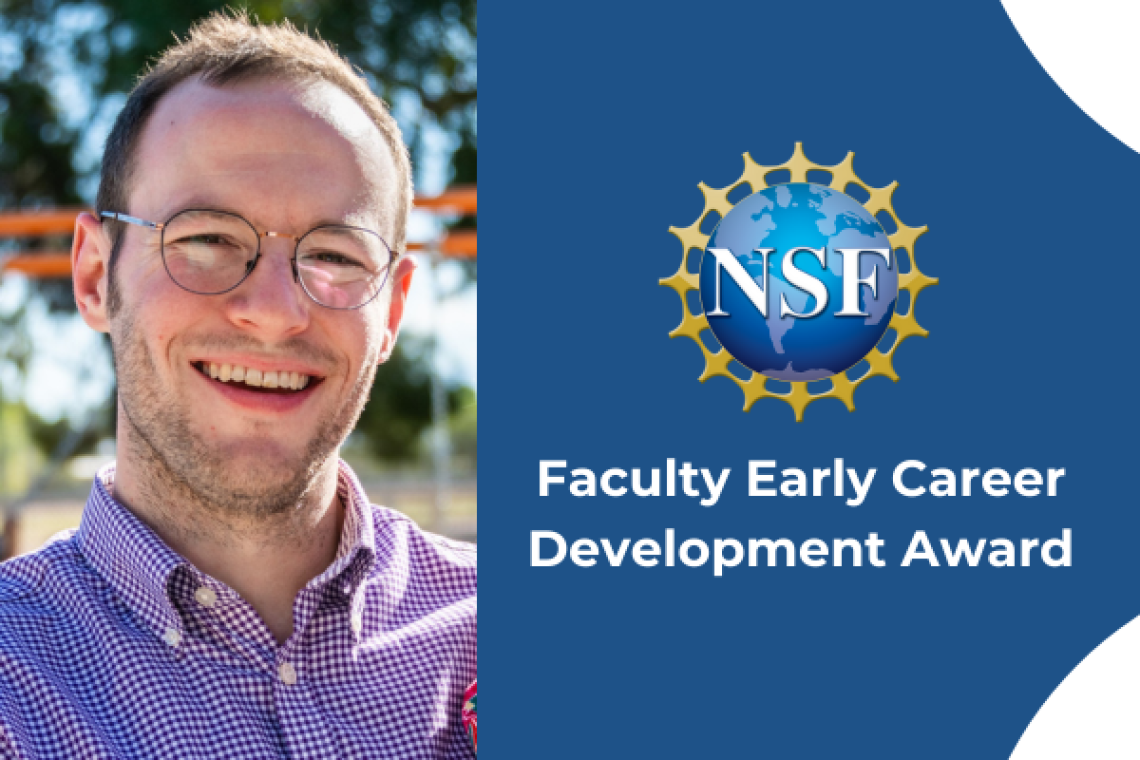Chris Henderson receives NSF CAREER Award to explore behavior of reaction-diffusion and kinetic equations

Dr. Chris Henderson, recipient of a 2024 National Science Foundation (NSF) CAREER Award.
Dr. Christopher Henderson, Assistant Professor in the Department of Mathematics in the College of Science, received the Faculty Early Career Development (CAREER) Award from the National Science Foundation (NSF), the foundation’s most prestigious honor for junior faculty members. He will receive $453,932 of funding over five years from the NSF's Division of Mathematical Sciences.
With the support of the CAREER funding, Henderson's research project will focus on the behavior of physical, chemical, and biological systems that can be modeled by partial differential equations (PDEs). The forces that determine the time-evolution of these systems are complex, making their analysis subtle and technical. Two fundamental questions the research will explore are the qualitative behavior of these systems, such as whether solutions have large fluctuations, and their long-time behavior, such as quantifying the speed with which an invasive species overruns a new environment.
The ability to understand the long-time behavior of PDE, including identifying the key quantities on which each long-time outcome depends, allows scientists to predict the behavior of real-world systems in a way that cannot be captured purely by numerical simulation, which, by necessity, is restricted to finite time scales. This project will develop novel methods for these goals.
"I am truly grateful to the NSF for their recognition and funding of my project,” said Dr. Henderson. “In the coming years, it will help recruit, train, and support future mathematicians and scientists starting from the undergraduate level. The Department of Mathematics here at UArizona has a long history of excellence, and this grant would not be possible without exceptional support of department staff and my research colleagues, as well as the collaboration of graduate students and postdocs. I am excited to continue in the tradition of academic distinction here."
Graduate and undergraduate research students will be integrated into the project, training the next generation of applied mathematicians and scientists. The project also involves a summer boot camp for entering applied mathematics Ph.D. students transitioning from adjacent, but non-mathematical fields that shore up their mathematical reasoning (logical thinking) and technical writing skills. Their training is impactful because these students have diverse interests (mathematical biology, machine learning, data science, PDE and numerical analysis, etc.) and go on to careers in industry, academia, and national labs.
Henderson's project will focus on advances in reaction-diffusion equations and collisional kinetic equations. In the former, the project will develop a novel "Stein's method" approach to PDE that is based on the observation that monotonic steady states of a given PDE satisfy first order autonomous ordinary differential equations (ODE) and that, to show convergence of a generic solution of the PDE to such a steady state, it is enough to show that the generic solution converges to a solution of the ODE. The research will leverage new functional inequalities and ideas in the calculus of variations. In the latter, the project will import techniques from parabolic theory and stochastic analysis to characterize when blow-up occurs in generic domains (both with and without boundaries). This requires the precise and quantitative understanding of the regularity of solutions near the boundary in physical space and the decay of solutions at "large" velocities.
“Mathematics faculty at Arizona have a long and distinguished history of analyzing fundamental mathematical properties of PDEs and applying their analysis to understand interesting physical phenomena,” said Dr. Doug Ulmer, Head of Mathematics at UArizona. “Chris is emerging as a leader of the next generation in this effort, and we are delighted that NSF has chosen to recognize his research, his potential for further transformative advances, and his commitment to education and mentoring.”
Learn more about the Department of Mathematics at UArizona here.

